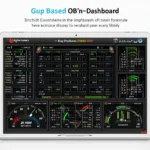OBD2 ecofuel devices claim to optimize fuel consumption and reduce emissions. But do they really work? This comprehensive guide dives into the world of OBD2 ecofuel, exploring its functionality, benefits, drawbacks, and ultimately helping you determine if it’s the right choice for your vehicle.
Understanding OBD2 Ecofuel Technology
OBD2 ecofuel devices plug into your car’s OBD2 port and claim to modify the vehicle’s ECU (Engine Control Unit) parameters to improve fuel efficiency. They supposedly analyze driving habits and adjust fuel injection, air intake, and other parameters to optimize performance and reduce fuel consumption. ecofuel obd2 devices often advertise significant fuel savings, sometimes up to 25%. However, these claims are often debated and require careful consideration.
How Does OBD2 Ecofuel Work?
The advertised mechanism involves the device learning your driving style over a period of time (typically 50-150 miles) and then adjusting the car’s fuel maps accordingly. However, the specifics of these adjustments are rarely disclosed, leading to skepticism among experts. Many experts argue that modern ECUs are already highly optimized, making significant improvements through simple OBD2 devices unlikely.
Benefits and Drawbacks of OBD2 Ecofuel
While the promised fuel savings are alluring, it’s crucial to weigh the potential benefits against the potential drawbacks before investing in an avis ecofuel obd2 device.
Potential Benefits
- Reduced Fuel Consumption: The primary advertised benefit is lower fuel costs.
- Lower Emissions: Theoretically, optimized combustion can lead to reduced emissions.
- Easy Installation: OBD2 devices are plug-and-play, requiring no professional installation.
Potential Drawbacks
- Unproven Effectiveness: Scientific evidence supporting the claimed fuel savings is limited.
- Potential ECU Damage: Modifying ECU parameters without proper knowledge can potentially harm the engine control system.
- Voided Warranty: Using aftermarket devices like OBD2 ecofuel can void your car’s warranty.
Is OBD2 Ecofuel Right For You?
Deciding whether to use an OBD2 ecofuel device requires careful consideration. While the potential for fuel savings is attractive, the lack of conclusive evidence and potential risks should not be ignored. ecofuel obd2 avis from existing users are mixed, adding to the uncertainty.
What to Consider Before Purchasing
- Research Thoroughly: Investigate the specific device and manufacturer, looking for independent reviews and testing results.
- Consult a Mechanic: Discuss the potential impact on your vehicle with a qualified mechanic.
- Consider Alternatives: Explore proven fuel-saving strategies like proper tire inflation, regular maintenance, and efficient driving habits.
Conclusion
The OBD2 ecofuel market is filled with promises of significant fuel savings. However, it’s crucial to approach these claims with a healthy dose of skepticism. Thorough research and consultation with a qualified mechanic are essential before investing in an obd2 ecofuel opiniones product. By understanding the technology, weighing the potential benefits and drawbacks, and considering alternatives, you can make an informed decision about whether OBD2 ecofuel is the right solution for your vehicle and your wallet.
FAQ
-
What is OBD2 ecofuel?
- OBD2 ecofuel refers to devices that plug into a car’s OBD2 port and claim to improve fuel efficiency.
-
How does it work?
- These devices claim to adjust ECU parameters based on driving habits.
-
Are the claims true?
- Evidence supporting significant fuel savings is limited and often disputed.
-
Is it safe for my car?
- There’s a potential risk of ECU damage and voided warranties.
-
What are the alternatives?
- Proven fuel-saving strategies include proper tire inflation, regular maintenance, and efficient driving.
-
Where can I find reliable reviews?
- Consult reputable automotive forums and review sites.
-
Should I consult a mechanic?
- Yes, discussing the potential impact on your vehicle with a mechanic is recommended.
Common OBD2 Ecofuel Scenarios
- Scenario 1: A driver notices no change in fuel consumption after installing the device.
- Scenario 2: The check engine light comes on after installing the device.
- Scenario 3: The car’s performance deteriorates after installing the device.
Further Reading and Related Topics
For more information about OBD2 scanners and related topics, you can explore these resources on our website: ecofuel review obd2
Need help with your OBD2 scanner or have questions about ecofuel devices? Contact us via WhatsApp: +1(641)206-8880, Email: [email protected] or visit our office at 789 Elm Street, San Francisco, CA 94102, USA. Our 24/7 customer support team is ready to assist you.

